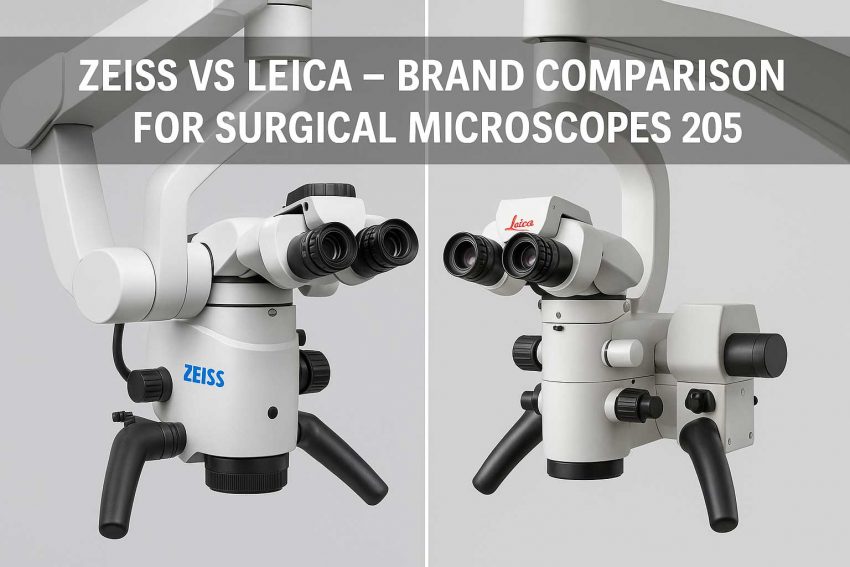When it comes to high-performance surgical microscopes, two brands dominate the global stage: Zeiss and Leica. Trusted by surgeons across neurosurgery, ENT, ophthalmology, and dental specialties, both companies offer world-class optical systems—but which one is right for your practice?
This side-by-side 2025 comparison will break down the differences in optics, ergonomics, digital features, specialties, and cost between Zeiss and Leica surgical microscopes.
Brand Overview
Zeiss Surgical Microscopes
- Headquarters: Germany
- Founded: 1846
- Notable Models: TIVATO 700, OPMI Lumera, EXTARO 300
- Strength: Unparalleled optics and advanced digital/robotic integration
Leica Microsystems
- Headquarters: Germany/Switzerland
- Founded: 1903
- Notable Models: M530 OHX, Proveo 8, M320
- Strength: FusionOptics for depth and resolution, ergonomic design
Optical Performance
Zeiss
Zeiss is globally recognized for its apochromatic lens systems, offering . Their optical pathways are engineered to support ultra-fine dissection, making Zeiss a top pick for neurosurgery and ophthalmology.
Leica
Leica introduced FusionOptics, a technology that combines deep depth of field with high resolution. While Leica’s contrast is excellent, some surgeons report slightly less edge-to-edge sharpness compared to Zeiss under high magnification.
Verdict: Zeiss edges out slightly for top-tier neuro/retinal applications. Leica provides broader depth for ENT and dental users.
Illumination and Imaging
Zeiss
Zeiss microscopes feature advanced LED and HAL coaxial lighting, adjustable spot sizes, and superb shadow control. Integrated 4K and 3D camera systems offer surgical teams and observers crystal-clear, real-time visuals.
Leica
Leica’s LED illumination is known for being both bright and cool. Most systems include built-in camera options (HD/4K) and simple integration with external recording systems.
Verdict: Both brands shine, but Zeiss integrates deeper with digital OR platforms and teaching systems.
Ergonomics and Controls
Zeiss
Zeiss prioritizes motorized precision with programmable foot pedals, joystick controls, and heads-up displays. However, their systems can be heavy and may require more training to use efficiently.
Leica
Leica’s microscopes are renowned for surgeon comfort, intuitive arm design, and lightweight movement. FusionOptics also reduces the need for frequent refocusing, minimizing fatigue.
Verdict: Leica wins for everyday comfort and usability, especially in ENT and dental procedures.
Feature Comparison Table
| Feature | Zeiss | Leica |
|---|---|---|
| Optical Clarity | ⭐⭐⭐⭐⭐ | ⭐⭐⭐⭐ |
| Depth of Field | ⭐⭐⭐⭐ | ⭐⭐⭐⭐⭐ (FusionOptics) |
| Digital Integration | ⭐⭐⭐⭐⭐ | ⭐⭐⭐⭐ |
| Ergonomics | ⭐⭐⭐⭐ | ⭐⭐⭐⭐⭐ |
| Ease of Use | ⭐⭐⭐ | ⭐⭐⭐⭐⭐ |
| Ideal For | Neuro, Eye, High-precision | ENT, Dental, Spine |
| Price Range | $$$$ | $$$ |
Price and Value
Zeiss microscopes are premium-priced—expect to invest more for systems with robotic positioning, AR overlays, and documentation support. They’re ideal for hospitals and institutions performing complex, high-risk procedures.
Leica offers flexible pricing across tiers, with excellent performance for most surgical needs at a lower entry cost. Their ergonomic innovations reduce surgeon fatigue in long procedures.
Verdict: Zeiss delivers maximum technology for top-end users. Leica wins for comfort, simplicity, and cost-effectiveness.
Final Verdict: Which Should You Choose?
- Choose Zeiss if: You need cutting-edge precision, neurosurgical tools, robotic integration, or AR-assisted views.
- Choose Leica if: You want ergonomic design, high-quality depth, ease of use, and better affordability.
Both Zeiss and Leica are exceptional surgical microscope brands—your choice depends on your clinical focus, budget, and workflow preferences.
